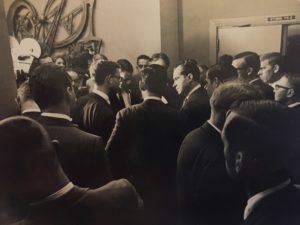I am indebted to Perry Morgan, my teacher.

Perry was editor of The Charlotte News when I went to work there full time in 1966. He must have loved me like a son because he chastised me at what seemed like every opportunity. When he thought I had colored outside the lines on a story, he would call me into his office and tell me to close the door. And then he would teach me something I had not known about our craft, something I had not learned at the UNC School of Journalism and might never have learned had it not been for him.
Here are the two wisest things he taught me.
One
If you cut someone in a story that is accurate and fair –and you gave them a chance to have their say– they will get over it. Eventually, Morgan said, they will become a source and will help you cut someone else.
He was right: I saw that happen again and again.
Why is that?
Clean wounds heal; dirty wounds do not. And inaccurate, unfair stories leave dirty wounds.
Two
It doesn’t matter what you think is off the record. What counts is, what does your source think is off the record?
Morgan wasn’t talking about letting someone take back a statement they had made on the record or, in any way, giving them control of my work.
He was talking about avoiding misunderstandings.
Here’s the truth of the matter:
If you don’t have a clear understanding with your source about what was on the record and what was not, and you report something the source thinks was off the record, he or she will never forgive you. They will think you have double-crossed them, and from that day on they will harm you at every opportunity.
Morgan had a colorful way of expressing himself. One afternoon after he had spiked* a story I had written that he considered half-baked he called me into his office, sat me down, and told me:
“I’m not going to let you strangle on people in my newspaper. You can cut their heads off, but I’m not going to let you strangle on them.”
* In the old days editors had spikes on their desks and when they held up publication of a story for any reason they would stick it on the spike — they “spiked” the story.
Coming Monday: The Life-Saving Vision
